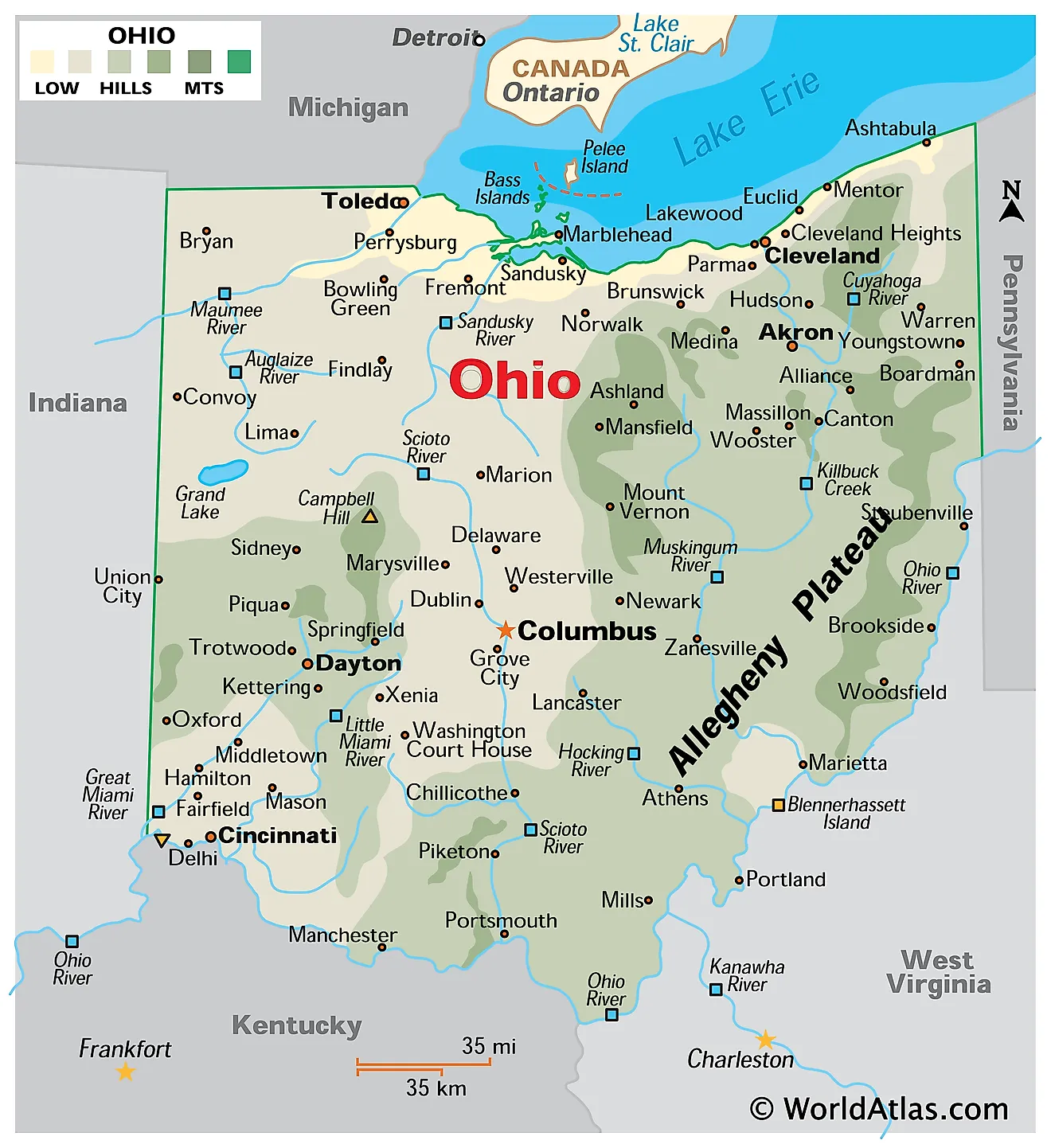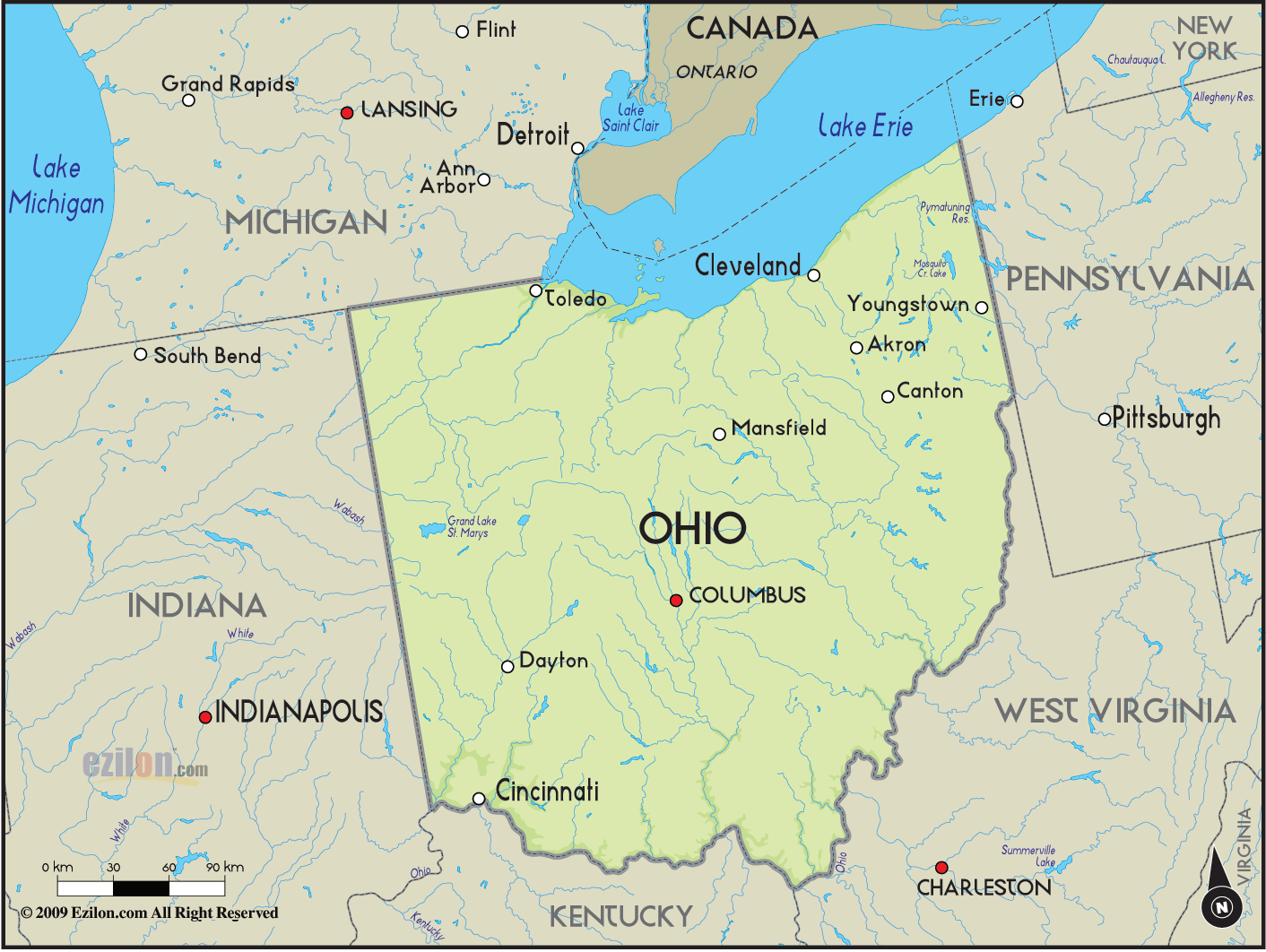Ohio Judge Kills Wife
Ohio Judge and a Tragic Loss - A Community Reflects
When news breaks about a situation involving someone in a position of public trust, like a judge, it can certainly send ripples through a community. The idea of an Ohio judge facing such a grave personal crisis, where a life is lost, prompts many deep questions about the nature of justice and the people who uphold it. This kind of event, though hypothetical in its specific details for this discussion, really hits home for folks, especially in a place like Ohio, where community ties often run deep, and the legal system is a core part of daily life. So, it's almost natural to wonder how such an occurrence might affect the collective sense of fairness and order.
The state of Ohio, as many know, sits on the northeastern edge of the Midwest, bordering Lake Erie to the north and sharing lines with Pennsylvania, West Virginia, and Kentucky. It's a place with a rich history, having been the 17th state to join the union back in 1803, the first state carved from the Northwest Territory. This long history means its legal structures have grown over time, becoming an established part of the state’s identity. The official website, Ohio.gov, offers services and information, showing just how organized and integrated the state’s government is into the lives of its residents. Basically, the systems are set up to serve the people.
A judge, in any state, holds a very important role within these systems. They are expected to interpret laws, preside over legal proceedings, and make decisions that affect people's lives in significant ways. The trust placed in them by the public is a cornerstone of how the justice system operates. When that trust is put to the test by events that appear to contradict the very principles they represent, it raises serious considerations for everyone involved, and for the broader public who depend on these institutions. You know, it makes people think about the bigger picture.
Table of Contents
- What Does it Mean When an Ohio Judge Kills Wife - A Look at the Role of Justice?
- How Does Such an Event Impact Trust in Ohio's Courts?
- Where Does Ohio Stand on Justice and Accountability?
What Does it Mean When an Ohio Judge Kills Wife - A Look at the Role of Justice?
The idea of an Ohio judge involved in such a personal tragedy, where a life is taken, really challenges our basic ideas about fairness and proper conduct. Judges are typically seen as people who embody the law, who stand for what is right and just. They are meant to be impartial, to weigh evidence, and to apply legal rules without personal bias. This is a big part of why people have faith in the courts. For instance, Ohio's government works to provide services and information, and the judicial branch is a major piece of that puzzle, offering avenues for people to seek resolution and protection under the law.
The state itself, with its capital in Columbus, a bustling city that's also the biggest in Ohio, has a well-established legal system. From the local courts in smaller towns like Delaware, which is about 25 miles northeast of Columbus, to the higher courts, the structure is designed to handle all sorts of legal matters. A person in a judicial position here is not just an individual; they represent a whole system of rules and expectations. So, when something so profoundly personal and damaging occurs, it feels like it shakes the very foundations of what that role is supposed to stand for. It’s a bit like a pillar of the community seeming to crumble.
This kind of occurrence, even as a hypothetical, forces a deeper look at the human element within the legal system. Judges, despite their significant responsibilities, are people, too, with personal lives and personal struggles. Yet, the public expectation for those who hold such power is often incredibly high. There's an unspoken agreement that those who dispense justice should themselves live lives that are, in some way, exemplary, or at least free from such profound personal failings that would bring the system into disrepute. This is just a natural reaction, you know.
The weight of judicial office in Ohio, and anywhere really, means that a judge's actions, both on and off the bench, are often viewed through a different lens. People look to them for stability and for a clear understanding of what is acceptable and what is not under the law. When an event like an Ohio judge being accused of taking a life happens, it creates a serious disconnect for many people between the ideal of justice and the reality of human actions. It's a very unsettling thought for a lot of folks, honestly.
How Does Such an Event Impact Trust in Ohio's Courts?
Trust in public institutions is a delicate thing, built over time through consistent, fair actions. When an incident involving an Ohio judge and a tragic loss comes to light, it can certainly put a strain on that trust. People start to question not just the individual involved, but the entire framework they represent. Ohio, as a state, works hard to provide services and maintain a sense of order for its residents. The government’s official site, Ohio.gov, exists to help people live, work, and do business, which implies a reliable system. When a figure within that system is linked to such a disturbing event, it can make people feel less secure about the fairness and integrity of the whole structure.
The courts are meant to be places where people can find resolution, where disputes are settled, and where justice is served. If someone who is supposed to be a guardian of that system is accused of a serious crime, especially one involving the loss of a life, it can create a widespread sense of unease. This isn't just about one person; it's about the collective faith in the institutions that are supposed to protect everyone. It's a bit like finding a crack in a foundation you always believed was solid, you know?
Ohio has a long history, becoming the 17th state in 1803, and it has seen many changes and challenges. Through it all, the legal system has been a constant. The expectation is that those who serve within it will uphold the highest standards. So, when an Ohio judge faces accusations of such a profound personal failure, it forces the public to grapple with how such a thing could happen within a system designed for justice. It’s a really tough pill to swallow for many, actually.
The Weight of Public Service in Ohio
Serving as a judge in Ohio carries a great deal of responsibility and, in a way, a certain public persona. People in these positions are not just employees; they are figures of authority and examples of legal conduct. They make decisions that affect families, businesses, and individuals every single day. The state, often called the "Buckeye State," has a population that looks to these officials for guidance and for the fair application of rules. So, the personal actions of an Ohio judge, especially when they involve something as serious as the loss of a life, can cast a very long shadow over their public service.
The judicial oath often speaks to upholding the law without fear or favor, and to acting with integrity. When an Ohio judge is involved in a situation that appears to go against these principles, it raises questions about the selection process, the oversight of judges, and the support systems available to those in such high-pressure roles. It's not just about the immediate incident; it's about the broader implications for the entire judiciary and how the public perceives its members. You know, people start to wonder about the whole picture.
This kind of event, in a place like Ohio, which is known for its diverse attractions from outdoor recreation to history and culture, really brings home the idea that even those in positions of power are still human. Yet, the expectations placed upon them are immense, and for good reason. The fabric of society relies on the consistent and fair application of its rules, and judges are at the very heart of that application. It's a pretty heavy burden, you know, being a judge.
Community Reactions to an Ohio Judge and a Tragic Loss
When news of an Ohio judge involved in a situation leading to the loss of a life spreads, the community's reaction can be quite varied, but often includes shock, sadness, and perhaps even a sense of betrayal. People in Ohio, whether in Columbus, Cleveland, or smaller towns, have a vested interest in the integrity of their local institutions. They depend on the legal system to protect them and to ensure fairness. So, an event like this can feel very personal, even if they don't know the individuals involved.
The sense of a community, particularly in a state like Ohio that prides itself on being "the heart of it all," can be deeply affected. There might be discussions in local coffee shops, on social media, and in neighborhoods about what this means for their town and for the broader state. Questions about accountability, about how such a person could hold such a position, and about the well-being of the victim's family would naturally arise. It's a very human response to a deeply troubling situation, you know.
This sort of incident also brings to the forefront the challenges of mental health and personal struggles, even for those in seemingly powerful positions. While the focus is on the actions and their consequences, the human aspect of the situation can't be ignored. The community, in its various forms, tries to make sense of something that often defies easy explanation. It's a very difficult thing to process, really.
Where Does Ohio Stand on Justice and Accountability?
Ohio, like all states in the United States, has a legal system built on principles of justice and accountability. When an Ohio judge is involved in a situation like the taking of a life, these principles are tested in a very public and profound way. The state's legal framework is designed to handle such serious matters, ensuring that due process is followed for everyone, regardless of their position or power. This means that even a judge would be subject to the same legal procedures as any other person. It's how the system is supposed to work, you know.
The state's commitment to fairness is evident in its long history as the 17th state, established with a clear set of laws and a functioning government. From its borders with Lake Erie to the north and its connections to states like Pennsylvania and West Virginia, Ohio's legal reach covers a wide and diverse population. The idea is that no one is above the law, and that accountability applies to everyone. This is a pretty fundamental part of the American legal tradition, actually.
The judicial process in Ohio, when it comes to criminal matters, involves investigations, potential charges, and trials, all aimed at determining facts and applying legal consequences. This process would apply equally to an Ohio judge accused of a crime, underscoring the principle that justice should be blind to status. It’s a very important concept for maintaining public trust in the system itself.
Ohio's Legal Framework and the Judicial Process
The legal framework in Ohio is quite comprehensive, a system that has grown and adapted since the state joined the union in 1803. It includes a series of courts, from local municipal courts to the Ohio Supreme Court, all working to uphold the rule of law. When a serious accusation, like an Ohio judge being involved in a death, arises, the process typically begins with law enforcement conducting a thorough investigation. This involves gathering evidence, interviewing people, and building a case based on facts.
Following the investigation, prosecutors would review the evidence to decide if charges are appropriate. If charges are filed, the accused, even an Ohio judge, would go through the standard legal steps: arrest, arraignment, potential bail hearings, and then the path towards a trial or a plea agreement. This entire process is guided by strict rules of procedure, designed to protect the rights of the accused while also seeking justice for the victim and the community. It’s a really complex dance of legal steps, to be honest.
The idea that everyone is subject to the same laws and procedures, regardless of their position, is a cornerstone of American justice. For an Ohio judge, this means that their professional standing would not grant them special treatment under the law. They would face the same legal scrutiny as any other citizen. This is a very important part of maintaining the integrity of the system itself, you know.
What Happens Next for an Ohio Judge in Such a Situation?
If an Ohio judge were to face accusations of taking a life, several immediate and significant steps would typically follow within the legal system. First, there would be a criminal investigation, just like for any other serious crime. Law enforcement agencies would gather evidence, interview people, and work to understand what happened. This is a pretty standard procedure for such grave allegations.
Beyond the criminal investigation, there would also be implications for the judge's professional standing. Judicial conduct commissions or other oversight bodies in Ohio would likely launch their own inquiries. These bodies are responsible for upholding ethical standards for judges and ensuring that those who serve on the bench act with integrity. Depending on the findings, a judge could face suspension, removal from office, or other disciplinary actions, separate from any criminal proceedings. It’s a layered approach to accountability, you know.
The legal and professional consequences for an Ohio judge in such a situation would be profound. The case would proceed through the courts, and if found guilty, the individual would face penalties prescribed by law, just like anyone else. This dual path of criminal prosecution and professional disciplinary action highlights the serious nature of the responsibilities held by those in judicial positions and the high expectations placed upon them by the public and the legal system itself. It’s a very serious matter, obviously.
Looking at the Broader Picture in Ohio
An event involving an Ohio judge and a tragic loss, while deeply personal for those directly affected, also prompts a wider reflection on the state of Ohio itself. Ohio, with its diverse geography from Lake Erie in the north to its rolling hills in the southeast, is a place where many different communities live and work. The state government, accessible through Ohio.gov, aims to serve all these people, providing services and maintaining order. When a significant event like this occurs, it reminds everyone that the systems in place are managed by people, and that human actions can have far-reaching effects.
The state's identity, often associated with being "the heart of it all" and a place for "outdoor adventures and amazing arts scenes," is built on a foundation of public safety and a functioning legal system. A situation like an Ohio judge being involved in such a grave incident can make people think about the strength of that foundation. It encourages discussions about how justice is administered, how public servants are held accountable, and how communities cope with unexpected and disturbing events. It’s a pretty big deal, honestly, for a community to process.
Ultimately, such a situation, even as a hypothetical discussion, serves as a stark reminder of the human element in all systems, including those designed for justice. It underscores the importance of trust, accountability, and the ongoing need for a legal framework that can respond fairly and effectively to even the most challenging circumstances. It’s a moment for reflection, in a way, for the whole state.
This article has explored the significant implications that would arise if an Ohio judge were involved in a tragic event leading to the loss of a life. We've considered the judge's role within Ohio's justice system, the potential impact on public trust in the state's courts, and how communities might react. The discussion also touched upon Ohio's legal framework, the judicial process that would follow such an accusation, and the broader societal reflections prompted by such a serious situation.

Cleveland, Ohio : CityPorn

Ohio Maps & Facts - World Atlas

Geographical Map of Ohio and Ohio Geographical Maps